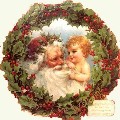Noël
Noël est la fête de l'enfance et du devenir. Bien avant l'époque romaine, on fêtait en Europe la renaissance tant attendue de la nature et l'espérance de vie nouvelle.
Car Noël, c'est aussi la vieille fête sacrée du solstice d'hiver. A la même époque de l'année, alors que les nuits sont devenues les plus longues et les jours les plus courts, se produit le solstice d'hiver quand le soleil repart pour sa longue course ascendante afin de rendre chaque jour un peu plus long.
Le solstice d'hiver
Dès que l'homme a commencé à cultiver la terre, il suivit attentivement la trajectoire du soleil tout au long de l'année, car c'était de lui que dépendait la nourriture, la chaleur et le bien-être.
Dans la nuit la plus longue de l'année, alors que l'hiver, le froid, la neige, le gel, ne semblent jamais devoir finir, dans cette nuit unique et terrifiante, nos ancêtres portaient au cœur la certitude du printemps. Le solstice d'hiver, n'en représente que le point culminant, la nuit sacrée entre toutes.
Les saturnales
Les romains invoquaient Saturne, dieu des semailles et de l'agriculture. Sa fête, les saturnales, donnait lieu à des réjouissances du 17 au 24 décembre. Les peuples nordiques célébraient Njord, dieu de la fécondité et Idun, gardienne "des pommes de providence", nourriture des dieux. Les orientaux rendaient un culte à Mithra, divinité de la lumière.
Toutes ces religions antérieures au Christianisme donnaient l'occasion de fêter le solstice d'hiver avec pour but de redonner courage et espoir au peuple effrayé par les sols gelés, l'absence de vie et l'obscurité.
Comme pendant nos fêtes de Noël actuelles, on offrait des cadeaux : des porte-bonheur, du miel, des gâteaux, de l'or étaient des cadeaux courants. On décorait les maisons avec du lierre, des branches de houx et de gui et tout travail, à part celui de la cuisinière et du banquier, était interdit.
Fête de la Nativité
La fête païenne fut christianisée pour devenir Noël, jour de naissance de l'enfant Jésus de Nazareth. Cette fête donne lieu à des offices religieux spéciaux et à des échanges de cadeaux et de vœux. Noël a été fixé à la date du 25 décembre par le pape Libère, en l'an 354. Parce que la plupart des églises orthodoxes suivent toujours le calendrier Julien qui présente un décalage de quatorze jours avec le calendrier Grégorien, désormais en usage officiellement, elles célèbrent Noël le 7 Décembre du calendrier Grégorien (c'est à dire le 25 décembre du calendrier Julien)
Egalement, dans beaucoup de provinces européennes, le cycle de Noël commence le 6 décembre, jour de la Saint Nicolas, pour se terminer le 6 janvier, le jour des rois.
Saint Nicolas, Santa Claus ou le Père Noël parcourt les campagnes pour distribuer friandises et cadeaux aux enfants. Les enfants qui attendent la visite du père Noël placent la veille de Noël, une chaussure dans la cheminée et se font une joie de découvrir au matin les présents apportés.
Le sapin a été couvert de lumières et de décorations. L'arbre de Noël, symbole du fort pouvoir de la nature, par la survivance de sa verdure, alors que tout est gris et nu ailleurs et par sa forme triangulaire et élancée vers le ciel.

